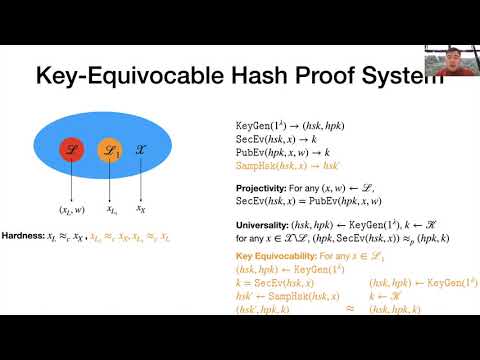CryptoDB
Simulation-Based Bi-Selective Opening Security for Public Key Encryption
| Authors: |
|
|---|---|
| Download: | |
| Conference: | ASIACRYPT 2021 |
| Abstract: | Selective opening attacks (SOA) (for public-key encryption, PKE) concern such a multi-user scenario, where an adversary adaptively corrupts some fraction of the users to break into a subset of honestly created ciphertexts, and tries to learn the information on the messages of some unopened (but potentially related) ciphertexts. Until now, the notion of selective opening attacks is only considered in two settings: sender selective opening (SSO), where part of senders are corrupted and messages together with randomness for encryption are revealed; and receiver selective opening (RSO), where part of receivers are corrupted and messages together with secret keys for decryption are revealed. In this paper, we consider a more natural and general setting for selective opening security. In the setting, the adversary may adaptively corrupt part of senders and receivers \emph{simultaneously}, and get the plaintext messages together with internal randomness for encryption and secret keys for decryption, while it is hoped that messages of uncorrupted parties remain protected. We denote it as Bi-SO security since it is reminiscent of Bi-Deniability for PKE. We first formalize the requirement of Bi-SO security by the simulation-based (SIM) style, and prove that some practical PKE schemes achieve SIM-Bi-$\text{SO}$-CCA security in the random oracle model. Then, we suggest a weak model of Bi-SO security, denoted as SIM-wBi-$\text{SO}$-CCA security, and argue that it is still meaningful and useful. We propose a generic construction of PKE schemes that achieve SIM-wBi-$\text{SO}$-CCA security in the standard model and instantiate them from various standard assumptions. Our generic construction is built on a newly presented primitive, namely, universal$_{\kappa}$ hash proof system with key equivocability, which may be of independent interest. |
Video from ASIACRYPT 2021
BibTeX
@inproceedings{asiacrypt-2021-31414,
title={Simulation-Based Bi-Selective Opening Security for Public Key Encryption},
publisher={Springer-Verlag},
doi={10.1007/978-3-030-92075-3_16},
author={Junzuo Lai and Rupeng Yang and Zhengan Huang and Jian Weng},
year=2021
}

